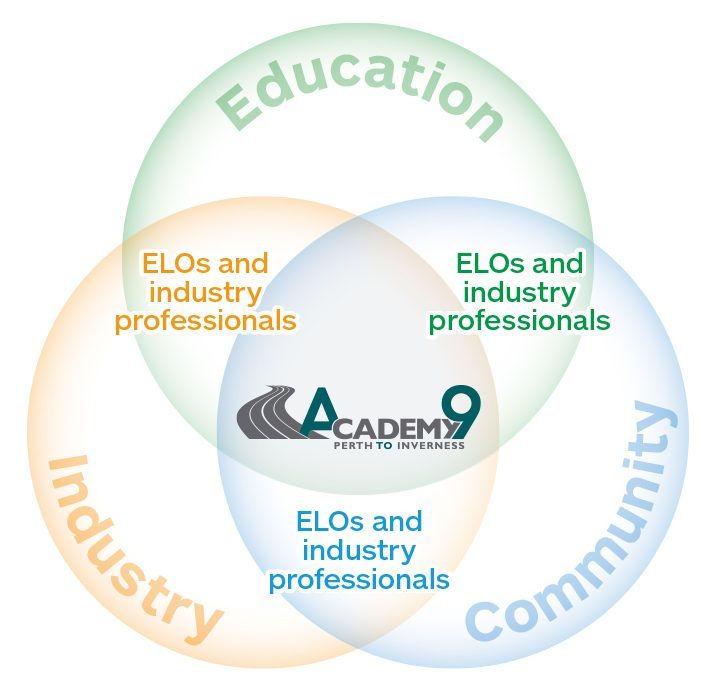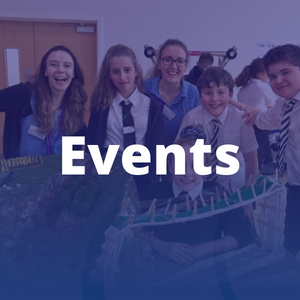
To illustrate these principles and practical measures, this case study gives information about the Academy9 programme. In the Appendix there are details of Academy9 core learning events and experiences.
Introduction
In 2015, the Knowledge Exchange Partnership Ltd. was invited by Transport Scotland to develop a framework (under the title of Academy9) to run in parallel with the upgrade of 80 miles of trunk road on the A9 between Perth and Inverness, to dual carriageway.
This Framework was introduced in May 2015 and highlighted a progressive, evolving programme of STEM-related activities and experiences covering school, college and university education. It is aimed at pupils, students, teachers, parents and the wider community, along the A9 corridor.
Academy9 sets out a strategic vision of educational engagement:
- Recognising and building upon knowledge exchange and creative thinking in professional and social contexts
- Capturing the power and potential of collaborative and partnership working
- Leaving a legacy of achievement and desire for learning for all.
It aims to achieve the following:
- To promote increased levels of knowledge and understanding about the upgrade of the A9 between Perth and Inverness
- To create positive STEM-related learning opportunities, linking achievement with clear career pathways and employment destinations
- To engage young people, teachers and the wider community in STEM-related activities that instil personal and social confidence, motivation and resilience
- To leave a legacy of STEM-related learning and good practice that impacts on future educational initiatives in and around the A9.
Phases
Academy9 was planned as a programme comprising several phases, each phase concurrent with a stage of the upgrade of the A9.
The aim of each phase was outlined as follows:
- Phase 1: Raising awareness and improving understanding about the benefits of upgrading the A9.
- Phase 2: Increasing the impact of STEM-related activities on the motivation and aspirations of young people.
- Phase 3: Strengthening the scope and depth of STEM-related education through legacy planning.
- Phase 4: Promoting good practice in partnership working between education and industry to improve the life chances of young people.
Partnership
The partnership comprises:
- Transport Scotland personnel – responsible for budgets, managing the A9 upgrade and co-ordinating Academy9
- Education specialists from The Knowledge Exchange Partnership Ltd., with the overall vision to drive the programme forward and provide expertise in a range of areas, including quality assurance
- Education Liaison Officers (ELOs) – industry-based individuals, with a mix of industry and education backgrounds, who deliver the programme by organising learning events and challenges for young people in schools and who contribute to everyday ideas, reflections, improvements, etc.
- Industry professionals working on the A9 upgrade, for example, as managers, engineers, geologists, ecologists, landscape architects, surveyors, etc. and who are official STEM Ambassadors.
Academy9 Partnerships

Collaboration and Integration
Academy9 is based on several assumptions/values:
- The vision for the programme is valid and worthwhile
- Sharing joint ownership of the programme is crucial for education and industry partners, members of the delivery team and participants
- Interactive challenges and innovation are at the core of a positive mindset
- Learning about STEM through work-relevant events/challenges benefits young people
- Education practitioners (teachers) need to be actively engaged with the events and challenges
- Mutual trust and respect lie at the heart of strong and sustainable collaboration between education and industry professionals
- Industry professionals are expected to lead events and challenges
- Staff in the programme welcome opportunities for learning from new experiences themselves, as well as providing learning experiences for young people
- The programme needs to be forward-thinking, dynamic, evolving and progressive
Organisation
A number of organisational features apply to Academy9:
- Input from education specialists (The Knowledge Exchange Partnership Ltd.) to provide expertise to the programme
- Creation of a Management Team with representation from all partners, meeting on a bi-monthly basis
- Establishment of a team of ELOs responsible for everyday planning, design and delivery, meeting on a monthly basis
- Regular communication between The Knowledge Exchange Partnership Ltd. and the ELOs, via video links, phone conferencing, face to face contact and email
- The development of a central, electronic, file-sharing, document storage facility, accessible by team members regardless of geography
- A secure and readily accessible physical storage space for catalogued programme resources.
Research
Research into STEM-related networks and current national priorities:
- Academy9 has tapped into existing STEM networks, with STEM Hub providers advising on local businesses in which STEM Ambassadors already operate, and advising about which local school(s) might be interested in establishing education-industry partnerships
- Academy9 uses industry professionals who are also registered as STEM Ambassadors – PVG [Reference 17] checking (essential for working with children/young people) is undertaken by STEMnet and training opportunities are provided to support industry professionals in their work with young people.
- Identifying current STEM programmes and government priorities.
Strategic Framework
A Framework was created for Academy9 in 2015 and updated in 2018/19:
- The Educational Framework (2015) outlined phases of the programme and gave information sufficient to initiate implementation
- The Revised Framework (2018/19) gave more detail, to reflect how thinking had evolved – Phase 1 had been completed; and there were emerging ideas about Phase 2
- The Framework is regarded as a working document – to be updated in line with fresh thinking and in parallel with developments in the construction work on the A9.
Innovative Approaches
Academy9 uses experimentation and controlled risk.
Some of the events and challenges have run more smoothly than others, but in all instances young people and delivery team members are stretched (sometimes beyond their comfort zone) to think ‘outside the box’ and work to their maximum potential.
This is at the heart of having high expectations and standards.
This approach (being willing to ‘have a go’) is embedded in positive mindset principles, encouraging young people (and delivery team members) to face interactive challenges ‘head on’, risk ‘failure’, learn from mistakes and enjoy success.
This type of experience helps build endurance and resilience that can become lifelong skills.
Outlined below are some of the core events, developments and challenges from Academy9.
The summaries provide brief information about the activities, the benefits, target audiences and time allocated.
Gateway Event
- Hosted by secondary schools, attended by associate primary school pupils.
- Audience: P4-5 pupils (ages 8-9)
- Purpose: Introduces pupils to the A9 dualling and Academy9 team
- Duration: Morning or afternoon event (half-day)
- Core Activity: Pupils take part in mixed team challenges relating to the A9
- Facilitated by Education Liaison Officers (ELOs) and young industry professionals (senior mentors)
- S3 pupils (junior mentors) are trained for the event
- Challenges focus on safety, planning, teamwork, spatial awareness, communication and problem solving.
Roadshow Experience
- Introduces STEM subjects – engineering, ecology and geology.
- Audience: P6-7 pupils (ages 10-11)
- Purpose: To understand how engineers build a road
- Duration: Teacher-led classroom activities – Morning or afternoon; Activity workshops – morning or afternoon event; Follow-on lessons – take place over 1-2 school terms
- Core Activity: Workshops on A9 Route Options, Ecology and Geology. A comprehensive manual of supplementary teaching materials is provided for follow-on lessons
- Challenges focus on exploration, investigation, communication, scientific experimentation and assessment of factors.
Town Planning Challenge
- World Town Planning Day (WTPD) consists of both teacher-led lessons as well as industry professional-led lessons.
- Audiences: S1 pupils (ages 11-12)
- Purpose: To understand processes of town planning
- Duration: Teacher-led classroom activities, based on 3 x 1-hour lessons relating to the geography curriculum
- Core Activity: S1 geography pupils learn about the roles of a town planner and a Geographical Information System (GIS) professional as well as having the opportunity to use GIS software to develop their own ‘towns’
- Challenges focus on what is town planning? The roles of a town planner, who town planners work with and how to become a town planner.
Apprenticeship Academy
- Audience: S2-3 pupils (ages 13-15) with S5-6 pupils (ages 15-16) acting as group mentors
- Purpose: Industry professional-led activities, based on bridge-building, the environment, road surveying and ground conditions, and risk resolution
- Duration: Two-and-a-half-day event
- Core Activity: A mega challenge – to build a bridge over a 3D landscape. Family and friends join the pupils and the Academy9 team for the challenge results and prize-giving to share the outcomes of the learning experience.
- Challenges focus on risk resolution, multi-disciplinary assessment, team-working, communication and careers.
Next Steps Workshop
- Requested by schools and in support of the ‘I can’ statements in the Career Education Standard 3-18 – available at: https://education.gov.scot/Documents/dyw2-career-education-standard-0915.pdf
- Audience: S5 pupils (ages 15-16)
- Purpose: Preparing for the workplace
- Duration: Part-day workshop
- Core Activity: Activities on interview techniques, and CV and personal statement writing. Pupils are given the opportunity to speak with professionals during a speed networking session.
- Challenges focus on preparation for the workplace – interview techniques, CV writing, personal statements and careers.
Industry Experience Week
- Piloted in November 2018 in partnership with SSERC
- Audience: Educational practitioners
- Purpose: To increase knowledge of STEM career pathways
- Duration: Five days
- Core Activity: Providing real-life knowledge about STEM-related careers and progression routes.
- Focuses on career skills, industry networks and processes, insights into the workplace, inspiration and confidence-building.
The following web link allows you to access the resources and detailed information you need should you want to use/adapt any of these for your own programmes.




